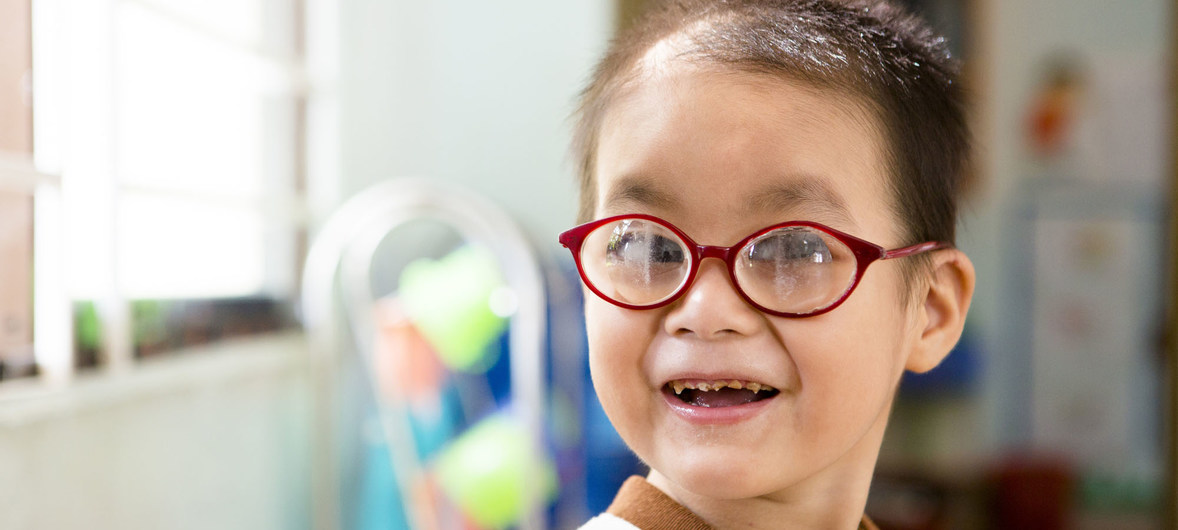Inclusive education, economic empowerment and technological innovations were the focus of discussion on Tuesday as world leaders gathered in London for the first-ever United Nations-backed Global Disability Summit.
Ahead of the Summit, Deputy Secretary-General Amina J. Mohammed cited the 2030 Agenda for Sustainable Development and a universally-adopted UN Convention as well-established commitments for advancing the rights of persons with disabilities.
“But too often,” she said, “this political commitment has not translated into significant improvements in the lives of the 1.5 billion persons with disabilities across the world.”
Moreover, women and girls with disabilities suffer the “double discrimination” of sex and disability, she noted.
Ms. Mohammed noted that later this year, UN Secretary-General António Guterres would issue a first-ever report on Disability and Development, to serve as a baseline for information about persons with disabilities in the context of the Sustainable Development Goals (SDGs).
“While Governments must lead, transformation requires the efforts of all of society,” she said, adding that young people, persons with disabilities, civil society and the private sector were among others working towards change.
“This Global Disability Summit is a timely opportunity to identify exactly how to change this situation as we implement the 2030 Agenda and to create value through inclusion and diversity as a human capital and cultural resource,” emphasized the deputy UN chief, as she urged “meaningful participation and results-based collaboration” and on “stepping up disability inclusion in SDG implementation.”
He linked the path to realizing the SDGs to a world free from marginalizing persons with disabilities.
“To realize the promise of the 2030 Agenda – and its core pledge to leave no one behind – it is essential that all peoples, particularly those facing discrimination and exclusion, have access and voice and can participate equally in every aspect of life,” Mr. Steiner stressed.
“This is a matter of justice, and equal opportunity, as well as economic growth. The costs of exclusion are simply too high.”
“‘Nothing about us without us’ is the mantra of the disability movement,” he stated, adding: “The UN system – stand behind this, and with all of you, as we move this important agenda forward together.”
Children in the fore
Painting a grim picture of the challenging situation for children with disabilities, Henrietta H. Fore, Executive Director of the UN Children’s Fund (UNICEF), said prejudice, stigma, or inaccessible learning preventing half of all those children from attending school, while the half that do, lack a quality education.
This, she said, is “a tragic waste of potential – for these children and for their societies and economies.”
“As a global community, we will not achieve SDG 4 – education for all – if we continue failing these children. Not just getting them into school, but improving the quality of their education,” Ms. Fore stated.
To help offset some of these challenges, the Global Partnership for Assistive Technology provides life-changing support – including wheelchairs, prosthetics and hearing aids – to 500 million people globally by 2030, she explained.
“For children with disabilities, these technologies help them see themselves, from an early age, as able – able to do the things they want to do. Move. Play. See. Hear. Interact. Learn. Communicate,” she elaborated.
Children with disabilities living through conflict or disaster face a double disadvantage. Sharing the same dangers of violence, hunger and safety threats, they also face unique challenges, including “lack of mobility because of shattered infrastructure, difficulty fleeing harm and the prejudices that keep them from accessing the urgent assistance they need,” flagged Ms. Fore.
“This Summit is an opportunity to translate our commitment to children with disabilities into a reality around the world, no matter where they live,” concluded the UNICEF chief.
For his part, UN Emergency Relief Coordinator Mark Lowcock told the gathering that worldwide, at least 15 per cent of the more than 130 million people who need humanitarian aid have disabilities.
“There is no silver bullet,” he said, “but the central, fundamental requirement is to include disabled people and their organizations in planning for and implementing responses to humanitarian crises,” which will “make for a better, more effective and humane response.”
The Summit is co-hosted by the Governments of Kenya and the United Kingdom, and the International Disability Alliance.


